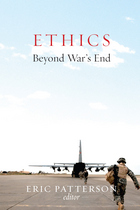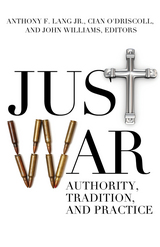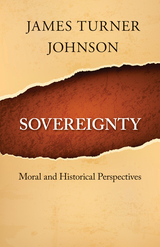
The wars in Afghanistan and Iraq have focused new attention on a perennial problem: how to end wars well. What ethical considerations should guide war’s settlement and its aftermath? In cases of protracted conflicts, recurring war, failed or failing states, or genocide and war crimes, is there a framework for establishing an enduring peace that is pragmatic and moral?
Ethics Beyond War’s End provides answers to these questions from the just war tradition. Just war thinking engages the difficult decisions of going to war and how war is fought. But from this point forward just war theory must also take into account what happens after war ends, and the critical issues that follow: establishing an enduring order, employing political forms of justice, and cultivating collective forms of conciliation. Top thinkers in the field—including Michael Walzer, Jean Bethke Elshtain, James Turner Johnson, and Brian Orend—offer powerful contributions to our understanding of the vital issues associated with late- and post conflict in tough, real-world scenarios that range from the US Civil War to contemporary quagmires in Afghanistan, the Middle East, and the Congo.

The just war tradition is central to the practice of international relations, in questions of war, peace, and the conduct of war in the contemporary world, but surprisingly few scholars have questioned the authority of the tradition as a source of moral guidance for modern statecraft. Just War: Authority, Tradition, and Practice brings together many of the most important contemporary writers on just war to consider questions of authority surrounding the just war tradition.
Authority is critical in two key senses. First, it is central to framing the ethical debate about the justice or injustice of war, raising questions about the universality of just war and the tradition’s relationship to religion, law, and democracy. Second, who has the legitimate authority to make just-war claims and declare and prosecute war? Such authority has traditionally been located in the sovereign state, but non-state and supra-state claims to legitimate authority have become increasingly important over the last twenty years as the just war tradition has been used to think about multilateral military operations, terrorism, guerrilla warfare, and sub-state violence. The chapters in this collection, organized around these two dimensions, offer a compelling reassessment of the authority issue’s centrality in how we can, do, and ought to think about war in contemporary global politics.

Sovereignty generally refers to a particular national territory, the inviolability of the nation’s borders, and the right of that nation to protect its borders and ensure internal stability. From the Middle Ages until well into the Modern Period, however, another concept of sovereignty held sway: responsibility for the common good. James Turner Johnson argues that these two conceptions—sovereignty as self-defense and sovereignty as acting on behalf of the common good—are in conflict and suggests that international bodies must acknowledge this tension.
Johnson explores this earlier concept of sovereignty as moral responsibility in its historical development and expands the concept to the current idea of the Responsibility to Protect. He explores the use of military force in contemporary conflicts, includes a review of radical Islam, and provides a corrective to the idea of sovereignty as territorial integrity in the context of questions regarding humanitarian intervention. Johnson’s new synthesis of sovereignty deepens the possibilities for cross-cultural dialogue on the goods of politics and the use of military force.
READERS
Browse our collection.
PUBLISHERS
See BiblioVault's publisher services.
STUDENT SERVICES
Files for college accessibility offices.
UChicago Accessibility Resources
home | accessibility | search | about | contact us
BiblioVault ® 2001 - 2024
The University of Chicago Press









